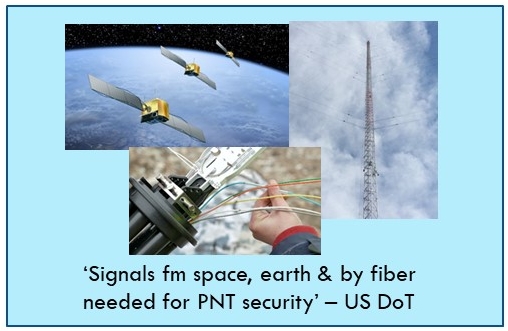Image: Shutterstock, RNT Foundation
What’s New: A paper from the Universities of Tokyo and Sydney examining PNT policies around the world.
Why It’s Important: Papers on PNT technology are easy to come by. No so much for ones on PNT policy, the area in which RNT Foundation works. Especially works not written by government officials.
The paper has three key observations about why achieving PNT resilience is and will be difficult:
- There is no agreed upon definition of “resilient PNT.” If folks can’t agree about what it is, it is very difficult to talk about it and achieve it. – Our take on this point is “Yes, but:”
- It is pretty easy, usually, to differentiate “more resilient” from “less resilient.” And more is better.
- User needs vary, so how useful would a universal definition, even if we could agree on one?
- “I know it when I see it.” That was Supreme Court Justice Potter Stewart’s take on defining hard-core pornography. That’ is also true for users and resilient PNT. They know it when they see it.
- No one is in charge. – As we and the US PNT Advisory Board have observed, PNT is a cross-cutting issue that impacts and is used by everyone. Leadership within governments is unfocused at best, often non-existent.
- PNT is too strongly associated with space. – This is absolutely the case, and perhaps a product of “no one is in charge.”

Ensuring PNT resilience: A global review of navigation policies and roadmaps
Joshua Critchley-Marrows School of Aerospace, Mechanical and Mechatronic Engineering, The University of Sydney Graduate School of Aeronautics and Astronautics,The University of Tokyo
Quentin Verspieren Graduate School of Public Policy, The University of Tokyo July 2023
1. INTRODUCTION
Positioning, Navigation and Timing (PNT) services have become the backbone of numerous vital infrastructures: banking and financial networks rely on space-based timing, various transportation services are fully dependent on satellite positioning, and so on. Any disruption of space-based PNT services, whether intentional or accidental, could have dramatic consequences for national security, public safety and economic security. In consequence, states owning and operating Global Navigation Satellite Systems (GNSS) have grown extremely concerned with the reliance of their infrastructure and its ability to provide stable and trustworthy PNT signals. How did these concerns manifest themselves? What are the resilience considerations included in the PNT policies and roadmaps that have been adopted by major operators of GNSS and other spacefaring countries in recent years? This work proposes a review and comparative analysis of the main navigation policies and strategy documents in the United States, Canada, the European Union, Russia, the United Kingdom, India, Japan, Australia, Türkiye, China and South Korea, to ensure the resilience of PNT services. An important aspect to this work is use of the word ensure, which implies action. This is contrary to assure, where only a verbal confirmation is given, or insure, which means failure is followed by consequences or compensation. The differences between each are illustrated in Figure 1.
READ MORE: Resilient_PNT_Policy_Report_FINAL_Univ Tokyo and Sydney


